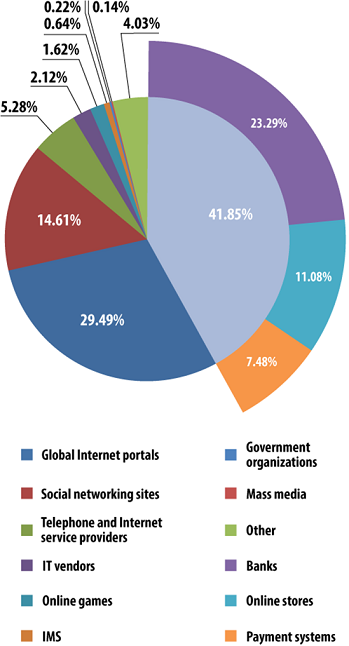Although it’s the height of summer and most businesses are in a natural lull, Kaspersky Lab’s experts reported a substantial increase in the amount of financial phishing in spam.
Although it’s the height of summer and most businesses are in a natural lull, Kaspersky Lab’s experts reported a substantial increase in the amount of financial phishing in spam. There was a 7.9 percentage points increase in the amount of scam emails exploiting the names of reputable banks, payment services, online stores and similar organizations; as a result, such messages represented nearly 42% of all phishing messages. Among all payment systems, cybercriminals paid most attention to PayPal: references to this service triggered the most dramatic increase in alerts from out anti-phishing component.

Organizations most frequently targeted by phishers, by category – July 2014
Overall the share of spam in the overall email traffic increased by 2.2 pp in July, bringing it to 67%. The USA is again the “leading” country of origin for unsolicited email: one sixth (15.3%) of all global spam was sent from this country. Russia keeps its long-standing second position in this ranking with 5.6% of all spam; this, however, is 1.4 pp less than in June. China remains in third place, supplying 5.3% of global spam.
If we look at the topics of spam, the long hot summer left its mark. In particular, the Russian segment of the Internet saw a surge of spam messages advertising sun protection and items to battle the heat. Also in July, Kaspersky Lab’s experts recorded an increase in the number of spam emails offering a variety of summer goods: air conditioners, cooling fans, sunscreen films for windows, bottled water and sunglasses.
Summer also means holidays, and since everyone wants to look their best on the beach spammers didn’t forget to offer some help. There were quite a number of spam emails in July advertising all types of skin care cosmetics and seasonal discounts from beauty shops and parlors. Kaspersky Lab’s experts also discovered video tutorials advertised as “beauty secrets” revealed by a renowned stylist.
Spammers did not overlook corporate users, either, although business activity is far from its peak in July. In the middle of the summer, cybercriminals specializing in distributing advertising emails in the Russian part of the Internet decided to grab users’ attention with offers related to organizing corporate events outdoors and aquatic entertainment.
"In summer, business activity slows down and spammers switch to more lucrative partner spam – including some malicious mailings. As a result, spam becomes more criminalized and poses a greater risk to users. Therefore in July we noticed that spammers were taking a greater interest in financial services. In addition, the top position in our ranking of malicious spam attachments was, for the first time in a long while, taken by a Trojan downloader used to steal users’ sensitive data," commented senior Kaspersky Lab spam analyst Tatyana Shcherbakova on July’s statistics.
The full report on spam trends in July is available on Kaspersky Lab’s official analysis resource at Securelist.com.
